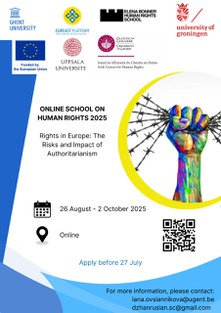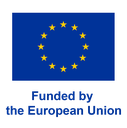Education
Summer School: previous editions
Rights in Europe: The Risks and Impact of Authoritarianism
Online School on Human Rights 2025

The objective of the School to equip participants with skills to understand human rights within different legal, political, and social contexts, critically analyse discursive narratives surrounding human rights, develop effective advocacy strategies, and conduct interdisciplinary human rights research.
The School is organised by ENLIGHT+ partners: Ghent University's Eureast Platform, The Irish Centre for Human Rights at the University of Galway, University of Groningen, and Uppsala University and Elena Bonner School of Human Rights.
Programme Format
The 6-week program between 26 August – 2 October includes 30 academic hours (3 ECTS credits) delivered entirely online in English, with interactive lectures twice weekly (Tuesdays and Thursdays at 18:00 CET), a methodological workshop, collaborative group projects, and networking opportunities with students from across Europe, the Caucasus, Russia, Belarus, Ukraine, Moldova and Central Asia.
Upon the completion of the lectures and implementation of the group project, the participants will be given the Certificates of Attendance. The School workload is equivalent to 3 ECTS (upon the recognition of students’ host universities). To qualify for the Certificate, participants must attend and actively engage in 10 lectures and complete the group project.
Programme
The School is structured into four thematic blocks, a methodological workshop, and a final project presentation.
Block 1: The mechanisms of human rights and its interaction with the nature of the political regime
- Lecture 1: Human rights, democracy and freedom: singing in unison?
- Lecture 2: The Implementation Gap: Challenges in Realising Human Rights
- Lecture 3: Economic, social and cultural rights: retreat in the age of neo-liberal ideology?
Block 2: New frontiers of human rights in a contested context
- Lecture 4: Women’s and LGBTQI+ rights versus ‘traditional values’? Contemporary global struggles around gender and sexuality
- Lecture 5: Digital rights in the era of post-truth
- Lecture 6: Climate justice: climate accountability for state and private companies
Block 3: Human rights and conflicts
- Lecture 7: State of emergencies and human rights in conflict
- Lecture 8: Justice and accountability for human rights violations
Block 4: From theory to practice: citizens’ engagement with human rights
- Lecture 9: Critical approaches to human rights: appropriation and abuse of human rights by authoritarian regimes
- Lecture 10: Human rights advocacy: citizens participation in human rights promotion and accountability
Methodological & Practical Components:
- Methodological workshop on interdisciplinary research on human rights: Equipping students with methods for analysis, documentation, and monitoring.
- Group Project: During the course, participants will work in small groups to research and prepare a project on a topic covered during the School, presenting their findings at the closing ceremony.
The full list of speakers from our partner universities will be confirmed soon.
Eligibility
The School welcomes final-year undergraduate and graduate students from Europe, the Caucasus, Russia, Belarus, Ukraine, Moldova and Central Asia who are interested in critically examining human rights challenges in contemporary political contexts.
To apply for the School, please submit an application via the registration form. All applicants must submit their CV (max. 2 pages) and a motivation letter (max. 1 page) explaining their motivation to take part in the School and their background in human rights.
Participation in the Online School on Human Rights 2025 is free of charge.
Contact
iana.ovsiannikova@ugent.be
dzhanruslan.sc@gmail.com
Find more information about the speakers and the programme of this summer school edition.
Supported by the European Union and the Eastern Academic Alliance
 |
 |
Online School on Human Rights
“Bridging Perspectives: Human Rights Dialogues Between Russia and Europe. The Future of Human Rights in Russia and the Challenges of European Fundamental Rights”
Date: 3 September – 10 October 2024

On the other hand, the European Union (EU), having passed through the history of wars and conflicts, has transformed into a Union founded on the principles of democracy, human rights, and the rule of law. In this regard, the EU has valuable insights to offer. However, the EU itself is facing a number of challenges, starting from climate change, which has repercussions on human rights, to the backsliding of democracies. In the end, the question is whether the European Union has as many powers as obligations to forge the observance of human rights. Those questions are intertwined into what can be an interesting comparative perspective of two human rights systems.
With this approach in mind, Ghent University’s Eureast Platform together with the Irish Centre for Human Rights and School of Law at the University of Galway, and in collaboration with the Elena Bonner School of Human Rights, organized an Online School on Human Rights 2024. This project was supported by the European Commission Foreign Policy Instrument initiative ‘EU Public Diplomacy - Russia’.
This Online School welcomed both Russian and European students and invited them to delve into human rights issues from two perspectives. First, the School presented an outlook on the deteriorating state of affairs of human rights in Russia with its root causes and repercussions. Second, as for the European perspective, the School provided an opportunity to examine the human rights construction in the European Union, focusing on climate change, migration, democracy and human rights nexuses. The program also encompassed a historical analysis of the transition to democracy and the restoration of human rights safeguards in some European countries.
This Online School offered a unique opportunity for European and antiwar-minded Russian students to exchange views on critical human rights issues. In the current context, where institutional contacts with Russian universities and students are limited, this School created a valuable space for such interactions.
Find more information about the speakers and the programme of this summer school edition.
Ukraine and the challenges of nationhood, individuality and survival.
Date: 12 – 16 September 2022
Focus and goals

The purpose of this multidisciplinary international Summer School is not only to provide a deeper understanding beyond the clichés of the conflict and the societies and environments involved, it is also to teach participants how to approach these clichés if they are to work with Ukraine in later professional environments or other capacities.
The focus is on Ukraine’s society and societal dynamics rather than on the grand geopolitics. Different experts on - and many also from - Ukraine offered an in-depth analysis of the following four topics, each of which was addressed in a separate thematic day:
• identity, culture and ‘culture wars’;
• economic-ecological dynamics;
• the ‘humanitarian frontline’;
• formal and informal governance.
This Eureast Platform summer school was initiated and compiled by the Department of Conflict and Development Studies and the Department of East European Languages and Cultures of Ghent University.
More information about the speakers and the programme of this summer school edition.
Online Summer School: Russia in Covid times
Date: 12-16 July 2021
Focus and goals
Russia remains a key player in international affairs during the COVID-19 outbreak. When the COVID-19 crisis erupted, Russia took several decisive steps to safeguard its sovereignty and increase its soft power capabilities: closing its border to China and developing its own Sputnik-V vaccine for use throughout the world. Over the course of the pandemic, Russia’s preparedness also ran into several difficulties: low levels of domestic interest in vaccination, questions over Sputnik’s effectiveness and production capabilities and concern that the state was more interested in using vaccines as a tool of international diplomacy over domestic needs. COVID-19 thereby serves as a critical issue to assess broader political and societal factors in Russia and its relation to the international system. What exactly is Russia’s role in the world? Does international/regional prestige outweigh domestic demands? How should we envisage the Russian domestic realm, the economic situation, and the means that are employed by the Kremlin to address challenges at home and abroad? This summer school aims at exploring and explaining these questions with a specific focus on the effect that the COVID-19 crisis has had on Russia’s political and societal life over the past year. Read more.
International students at Ghent University
Are you considering studying at Ghent University? We have over 50 Master programmes taught in English which are open to international students. We welcome students from our partner universities for 1 or 2 semesters in Ghent. You should check whether your home university has a Cooperation Agreement with Ghent University.
You can consult all information for prospective students: courses and programmes, application, housing etc.
Prospective PhD students
Are you considering to do a PhD at Ghent University?